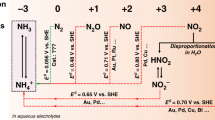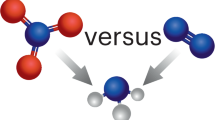Abstract
THE following details of the early history of the oxidation of ammonia, a process which became of great importance during the war, do not appear generally to be known, and may be of interest. The first clear statement of the oxidation of ammonia which I have seen is contained in a paper by the Rev. Isaac Milner, B.D., F.R.S., president of Queens' College, Cambridge, published in the Philosophical Transactions for 1789 (vol. 79, pt. 2, pp. 300–13), and republished in Crell's Annalen (1795, pt. 1, pp. 550–62). The title of the English paper is “On the Production of Nitrous Acid and Nitrous Air,” and the German paper is a translation, in which “nitrous acid” is rendered “Saltpetersäure” and “nitrous air” (i.e. nitric oxide, NO) “Saltpeterluft.”
This is a preview of subscription content, access via your institution
Access options
Subscribe to this journal
Receive 51 print issues and online access
$199.00 per year
only $3.90 per issue
Buy this article
- Purchase on Springer Link
- Instant access to full article PDF
Prices may be subject to local taxes which are calculated during checkout
Similar content being viewed by others
Author information
Authors and Affiliations
Rights and permissions
About this article
Cite this article
PARTINGTON, J. The Oxidation of Ammonia. Nature 109, 137–138 (1922). https://doi.org/10.1038/109137b0
Issue Date:
DOI: https://doi.org/10.1038/109137b0
Comments
By submitting a comment you agree to abide by our Terms and Community Guidelines. If you find something abusive or that does not comply with our terms or guidelines please flag it as inappropriate.



